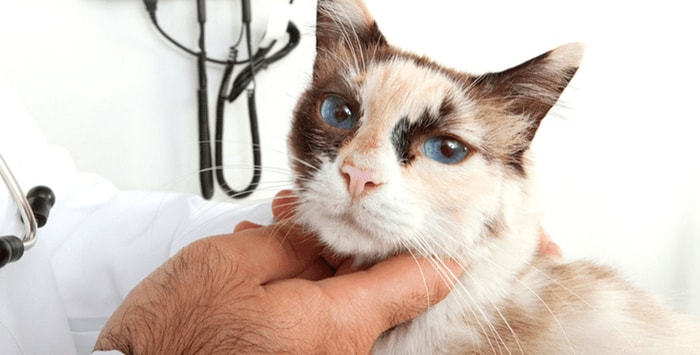FIV in cats or Feline Immunodeficiency Virus (FIV) is one of the most important diseases of cats found throughout the world. The disease affects the immune system of cat and makes vulnerable to many other diseases. Many cats may carry the virus in their body asymptomatically and live an average lifespan. The disease is dangerous when the immune system is weak, and the cat is affected by opportunistic bacteria, viruses, or protozoa. The FIV in cats cannot cure completely, and cats can live with this virus.
Important Information About FIV
Cats are one of the lovely pets in the house. Cats are suffering from many infectious and non-infectious diseases. FIV in cats is one of the most critical diseases in the cat population. The disease spread from cats by mainly biting wounds and indirectly from contaminated food and water. There is no specific treatment and the preventive vaccine available for Feline AIDS. As a cat owner, you must be very cautious to prevent the entry of this disease into your house.

Causes of FIV in Cats
Feline Immunodeficiency Virus is the causal organism of FIV in cats. The virus is under the Lentivirus genus and Retroviridae family. The virus has simial effects to AIDS in humans causes the weakening of the host’s immune system. The virus primarily affects the white blood cells (WBC) of hosts. The host mainly dies from secondary infection by other organisms.
Epidemiology and Transmission of Feline AIDS
FIV in cats found worldwide distribution. In the United States, 2.5-5% of healthy cats are found positive for the Feline Immunodeficiency virus. The incidence rate is more in sick cats. There is no effective vaccine against FIV available.
The virus is primarily transmitted by the biting wound of an infected cat. The secondary transmission occurs very little by the contaminated water bowl, feed bucket, toys, grooming equipment, and household items. There is little chance of the spread of the disease from infected mothers to kittens. Sexual contact with a male cat is a less powerful method of transmission of FIV.
What are the Symptoms of FIV in Cats?
The disease develops clinical signs very slowly, and a cat may be continued as a carrier for years. Your cats may show series of clinical signs and symptoms after a long period of healthy life. The typical clinical signs are:
- Poor body conditions.
- Intermittent fever.
- Lack of appetite.
- Enlargement of lymph nodes.
- Inflammation in the buccal cavity (mouth) and gum (gingivitis).
- Chronic problems in the skin, eyes, upper respiratory tract.
- Persistent diarrhea in cats.
- Changes in behavior in cats.
- Changes in blood parameters, i.e., increased protein content in the blood.
- Neurological disorders and seizures.
- Loss of body weight.
- Death of the cats due to multiple problems.
Diagnosis of FIV in Cats
The standard diagnostic procedures of FIV are as follows:
- History of infection to other cats.
- The vet and owner observed specific clinical signs.
- Chronic diseases.
- Progressive weakness of the cat.
- Blood parameters for protein.
- PCR for the identification of the causative virus.
- ELISA and CFT for serological diagnosis of FIV antibodies in cats.
Treatment of Feline Immunodeficiency Virus
There is no specific and effective medication available for FIV in cats. You can manage the disease by providing supportive treatment by the suggestions of your veterinarian. The supportive treatment and management advice are:
- A potential antibiotic to prevent secondary bacterial infection.
- Fluid and electrolyte therapy to improve the body condition.
- A healthy and nutritious diet should be provided to improve the health and immune system.
- Regular health check-ups by a veterinarian.
- Drugs used in treating the Human Immunodeficiency Virus (HIV) were also found effective against cats.
Prevention and Control FIV in Cats
There is no preventive vaccine available for FIV in cats. The preventive measures that you can follow in your cats are:
- Restrict the entry of doubtful cats into your house.
- Collect or purchase cats from known sources and free from FIV.
- Regular health check-up
- Vaccinate your cat against the potential diseases of cats.
- Spaying of female cat (queen) to prevent the transmission to offsprings.
- Neuter the male cat to reduce the risk of transmission.
- Observer the behavioral and feeding habit changes in your cats.
- Never give raw meat, fish, and eggs in a cat’s diet.
Zoonotic Importance of Feline AIDS
Feline AIDS is caused by the FIV virus very similar to HIV and causes a disease similar to Acquired Immunodeficiency Syndrome (AIDS) in cats. The virus is highly species-specific and never transmits to humans from cats. FIV only transmits from cat to cat. So as a cat owner, it would be best if you feared that this disease is your cat.
Final Advice on Feline Immunodeficiency Virus
Feline immunodeficiency Virus is also called Feline AIDS as it produces signs similar to HIV. The disease is significant as there is no specific treatment. A well-managed cat can be survived several years with latent infection. In my article, I have tried to highlight the most critical points on this disease for cat owners.